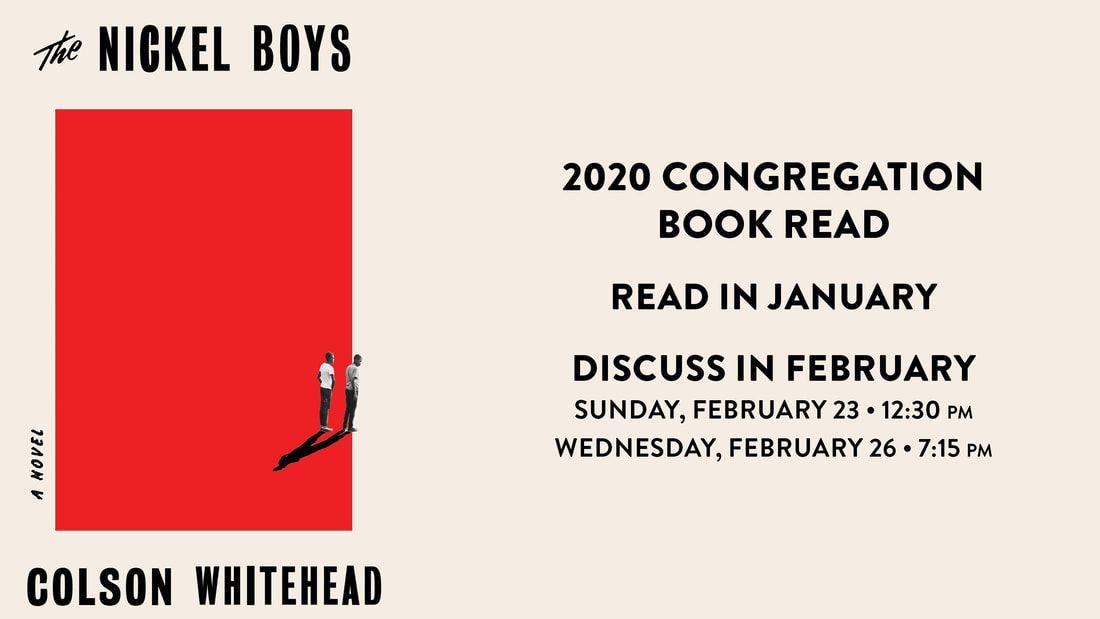|
The Nickel Boys by Colton Whitehead
Doubleday, 2019 By Shelley Butler Before I even ordered a copy of The Nickel Boys, I read its many accolades: longlisted for the National Book Award, Kirkus Award-winner, National Book Critics Circle Book Award finalist, one of the Top Ten Books of the year of Time magazine, New York Times bestseller (of course), and great book reviews. They had me at the National Book Award but this one stood out to me the most: “A necessary read.” — President Barack Obama The “Nickel boys” refers to a group of boys in, and later survivors of, a horrifying fictional reform school in Florida. We meet Elwood in the early 1960s at the home of his grandmother, who is raising him. He is an earnest boy with plans to go to the local black college, and he is discovering hope and power through the words of Dr. Martin Luther King, Jr. Through no fault of his own, he is arrested and sentenced to the Nickel Academy, a juvenile reform school for boys as young as five years old, with no fixed term of detention. Boys are supposed to be educated, earn their way up a ladder of good deeds to get out, and turned back into the world as good men. Elwood soon learns that Nickel is as abusive, corrupt, and criminal a place as could possibly exist. The “reform school” is segregated, but Whitehead makes clear that being white doesn’t give you much, if any, advantage at a place like this. The Nickel Boys doesn’t take you into this house of horrors for no reason. Elwood sees and experiences some of the worst of it, but still hangs on to King’s message of maintaining dignity against all odds, and especially his words, “Throw us in jail and we will still love you.” His friend Turner is of an opposite point of view, just trying to stay alive and out of trouble in any way he can. The story revolves around the two points of view and the events that lead them to a startling conclusion. The reader will have to decide for themselves if either of them, or if both of them, is right. And if you think by the end of the book that a place like this could not exist in the United States in our lifetimes, think again. This story was based on the traumatizing, life-altering true experiences at Dozier Academy. That it operated for 111 years and only closed in 2011 is only part of the anguish. The true stories of the “White House Boys,” survivors of the violence, tell of beatings so severe that some boys were beaten to death. The institution didn’t keep records of everyone who died there, some of whom were buried in unmarked graves. A team of forensic anthropologists began an investigation into deaths at the school, and the unmarked graves, and uncovered more and more bodies. The whole truth of the place may never be known. How does this happen? Why were reports of abuse over the past 60 years not taken more seriously, the perpetrators of violence not brought to justice, and the institution closed? I think Whitehead’s point is that it did happen, and present-day America is not without its own versions of Nickel/Dozier boys cruelty. When this title was recommended to the Beloved Community Staff Team, the Library and Bookstall Team, and the Racial and Restorative Justice Team, co-sponsors of the 2020 Unity Church Congregation Read, we all agreed it was a good choice. Books are for sale in the Unity Bookstall and a limited number to check out from the Anderson Library. Please join the book discussions coming up on Sunday, February 23, at 12:30 p.m. and/or Wellspring Wednesday, February 26, at 7:15 p.m. Haven’t read or finished it yet? Come anyway — these are sure to be thought-provoking, maybe even action-provoking discussions.
0 Comments
Leave a Reply. |
Topics
All
Beloved Community ResourcesUnity Justice Database
Team Dynamics House of Intersectionality Anti-Racism Resources in the Unity Libraries Collection Creative Writers of Color in Unity Libraries The History of Race Relations and Unity Church, 1850-2005 Archives
July 2024
Beloved Community Staff TeamThe Beloved Community Staff Team (BCST) strengthens and coordinates Unity’s antiracism and multicultural work, and provides opportunities for congregants and the church to grow into greater intercultural competency. We help the congregation ground itself in the understanding of antiracism and multiculturalism as a core part of faith formation. We support Unity’s efforts to expand our collective capacity to imagine and build the Beloved Community. Here, we share the stories of this journey — the struggles, the questions, and the collaborations — both at Unity and in the wider world.
The current members of the Beloved Community Staff Team include Rev. Kathleen Rolenz, Rev. KP Hong, Rev. Lara Cowtan, Drew Danielson, Laura Park, Lia Rivamonte and Angela Wilcox. |
